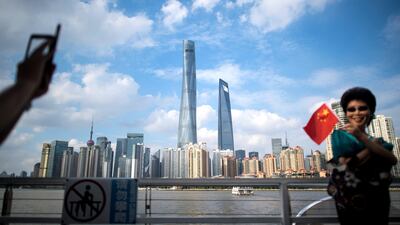S&P Global Ratings cut China’s sovereign credit rating for the first time since 1999, citing the risks from soaring debt, and revised its outlook to stable from negative.
The sovereign rating was cut by one step, to A+ from AA-, the company said in a statement yesterday. The analysts also lowered their rating on three foreign banks that primarily operate in China, saying HSBC China, Hang Seng China and DBS Bank China would be unlikely to avoid default should the nation default on its sovereign debt.
“China’s prolonged period of strong credit growth has increased its economic and financial risks,” S&P said. “Although this credit growth had contributed to strong real gross domestic product growth and higher asset prices, we believe it has also diminished financial stability to some extent.”
The downgrade, the second by a major ratings company this year, represents ebbing international confidence that China can strike a balance between maintaining economic growth and cleaning up its financial sector. The move may also be uncomfortable for Communist Party officials, who are just weeks away from their twice-a-decade leadership reshuffle.
_______________
Read more:
Moody's maintains G20 growth forecasts despite geopolitical risk
Chinese banks under pressure over government lending crackdown
_______________
"It’s bad optics for China, especially when they’re out there from a policy and rhetorical standpoint talking about debt more and acknowledging their debt challenge," said Andrew Polk, co-founder of research firm Trivium China in Beijing. "It may feel like potentially the international community is piling on and that will be frustrating."
The Finance Ministry in Beijing didn’t immediately respond to a fax after normal business hours seeking comment on the ratings change. In May, it refuted the downgrade by Moody’s Investors Service, saying the company had overestimated economic difficulties.
Scholars at the Chinese Academy of Social Sciences (CASS), a government think tank in Beijing, said recently that the level of government debt isn’t as risky as it might look, given the amount of assets that the state commands. CASS calculates that government assets stood at about 125.4 trillion yuan in 2015, or about 1.8 times gross domestic product.
The world’s second-biggest economy is forecast to slow after a robust first half, when it started the year with the first back-to-back quarterly acceleration in seven years, then surprised economists by matching that 6.9 per cent expansion again in the second quarter. Economists surveyed by Bloomberg this month project growth will remain above 6 per cent through 2019.
The International Monetary Fund last month increased its estimate for China’s average annual growth rate through 2020, while warning that it would come at the cost of rising debt that increases medium-term risks to growth. This month, IMF Managing Director Christine Lagarde said at an event in Beijing that leaders are making critical efforts to rein in risk.
"The impact for China is pretty limited," Tom Orlik, chief Asia economist at Bloomberg Intelligence in Beijing, said of S&P’s cut. "China is a country with a huge store of domestic savings and a still tightly controlled capital account. China doesn’t rely on foreign funding."
History suggests little relationship between sovereign rating cuts and debt performance. US.Treasury yields in 2011 moved little when S&P lowered the country’s credit score.
Foreign investors make up less than 2 percent of the onshore bond market -- something policy makers are trying to change. Debt issued offshore by Chinese borrowers has been in effect mainly domestic, with home buyers taking up about 65 percent of bond sales in the first half of the year, according to Australia & New Zealand Banking Group.
"The cuts of Moody’s and S&P don’t really reflect the international investors’ view on China’s economy," said Wang Tao, chief China economist at UBS Group in Hong Kong, adding that risks have been reduced, corporate profits are rising, shadow financing has been reined in and capital outflows contained, she said. "This is pretty behind the curve."
In the event that China were to default on its external debt, S&P said that three foreign banks operating there would be "unlikely to withstand a stressed scenario."
Moody’s cut its rating on China to A1 from Aa3 in May, citing similar concerns over economy-wide debt and effects on state finances. Moody’s cited the likelihood of a “material rise” in debt and the burden that will place on the state’s finances, while also changing the outlook to stable from negative.
“The market has already speculated S&P may cut soon after Moody’s downgraded,” said Tommy Xie, an economist at OCBC Bank in Singapore. “This isn’t so surprising.”

